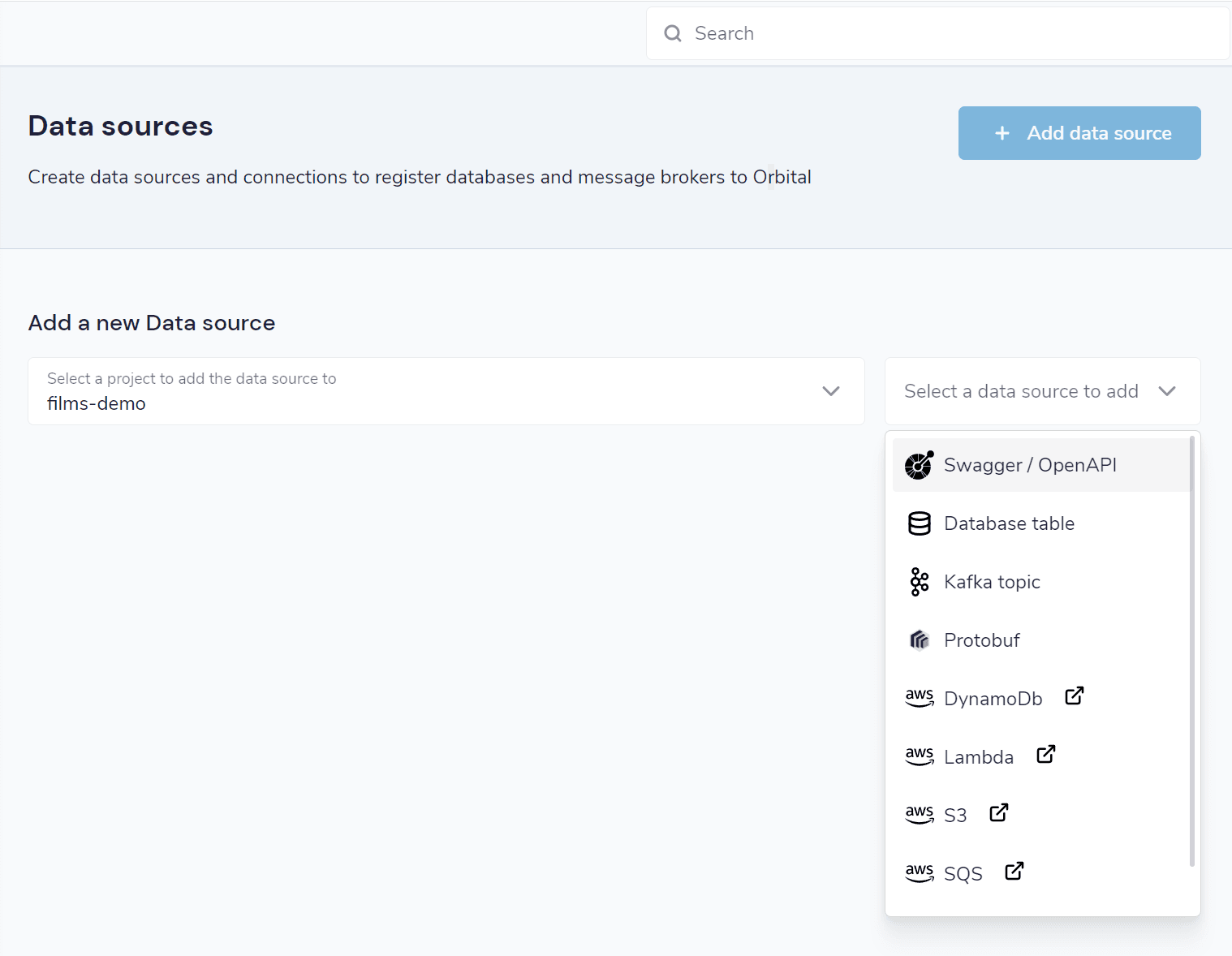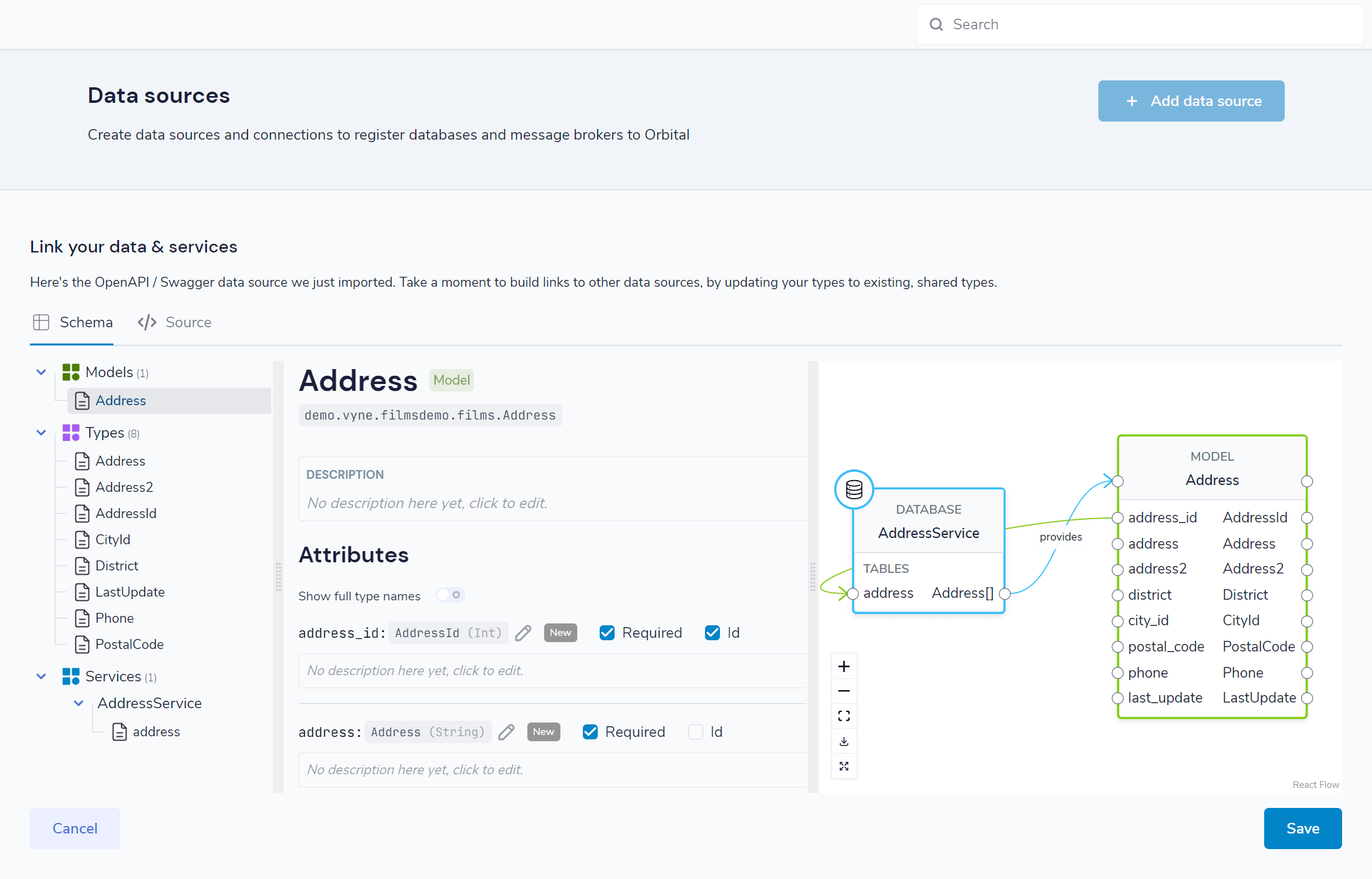Managing data sources
Using OpenApi to describe your services
Orbital can use OpenApi specs to understand what APIs exist, and how to call them.
Orbital uses Semantic schemas to describe how data relates between systems. For OpenAPI, this means enriching return types and input parameters with metadata to describe them semantically.
To do this, we embed Taxi metadata within the OpenApi specs.
Adding Taxi annotations to OpenApi specs
Taxi annotations use a custom x-taxi-type block within OpenApi specs.
Example:
x-taxi-type:
# The name of the type
name: com.acme.MyType
# Optional. Indicates if the type should be created if not already present.
create: falseThe create element is optional, and overrides the default behaviour.
If create is set to false, then schemas which attempt to publish types that aren’t already defined on the schema server
are rejected as compilation errors.
This is to prevent accidental typos.
However, the default behaviour for create is different between response models and attribute types:
| Entity type | Default create behaviour | Impact |
|---|---|---|
| Model (Response type) | true | By default, if the model isn’t already present within the schema, it’s created. |
| Attribute | false | By default, if an attribute type isn’t already present within the remote schema, then the OpenApi spec is rejected |
Describing response types
Response models returned from API calls can be enriched to include semantic metadata
Assigning Taxi type names to models
You can optionally define a custom type name for response types being published to Orbital. If omitted, then the type name is inferred from the rest of the schema
components:
schemas:
Pet:
# Assign a Taxi type name to the model.
# Optional
x-taxi-type:
name: petstore.Pet
# Everything else is standard OpenApi spec...
allOf:
- $ref: '#/components/schemas/NewPet'
- required:
Adding type annotations to attributes
Enrich attributes with semantic type metadata
NewPet:
required:
- name
properties:
name:
x-taxi-type:
name: petstore.Name
type: string
tag:
x-taxi-type:
name: petstore.Tag
type: string
By default, it’s expected that types referred to in x-taxi-type within attributes have already been defined on the schema server, as part of your
core taxonomy.
However, if you are intentionally publishing new types from your OpenApi spec, then set create to true:
NewPet:
required:
- name
properties:
name:
x-taxi-type:
name: petstore.Name
# petstore.Name will be created if not present
create: true
type: string
Describing service parameters
Inputs into services can also be enriched, to annotate the semantic data required.
Simply add a x-taxi-type annotation to each input, containing a name attribute with a reference to the name of the type from your core taxonomy
## ... OpenApi spec trimmed...
paths:
/pets/{id}:
get:
description: Returns a user based on a single ID, if the user does not have access to the pet
operationId: find pet by id
parameters:
- name: id
in: path
description: ID of pet to fetch
required: true
schema:
type: integer
format: int64
x-taxi-type:
name: petstore.PetId # <-- Name of type from core taxonomy
Publishing OpenAPI specs to Orbital
Once you have added taxi annotations to your OpenApi spec, you’re ready to publish it to Orbital.
Different ways to publish OpenAPI specs
There are a few different ways to expose your OpenAPI spec to Orbital, each which suits different team workflows.
| Approach | Description | Suits teams who… | Considerations |
|---|---|---|---|
| Importing through the UI docs | Converts the OpenAPI spec to Taxi, and stores it within your Taxi project. | Good for teams that prefer to work in Taxi | Changes made to the OpenAPI spec are not reflected in your Taxi automatically, you’ll need to re-import |
| Reading from a git repo docs | Declares the OpenAPI spec as a project in your workspace. Keeps the OpenAPI spec as a source-of-truth, and allows a team to evolve the spec independently | Best for distributed teams or federating multiple APIs, where teams evolve their API specs independently | Changes made to the OpenAPI spec are automatically detected Requires adding Taxi annotations to the OpenAPI spec |
| Mixing OpenAPI and Taxi in the same project docs | Keeps your OpenAPI spec as source-of-truth, but stores alongside other Taxi sources | Best when a single team owns/manages Orbital, and wants a mono-repo approach | Changes made to the OpenAPI spec are automatically detected Requires adding Taxi annotations to the OpenAPI spec |
Combining OpenAPI and Taxi in a single project
You can configure your Taxi project to read OpenAPI specs directly by defining their location in the additionalSources section of your taxi.conf file.
Example directory structure:
.
├── src/ # Taxi files
├── openapi/ # OpenAPI specs
└── taxi.conf
Configure in your taxi.conf:
name: com.example/my-taxi-project
version: 0.2.0
sourceRoot: src/
additionalSources: {
"@orbital/openapi" : "openapi/*.yaml"
}OpenAPI-specific configuration
Available since 0.37You can optionally provide additional metadata for your OpenAPI spec by creating a .taxi.conf file with the same name as your spec.
If no config file is provided, Orbital will use the project’s organization as the default namespace.
| Property | Example | Description | Default |
|---|---|---|---|
defaultNamespace | com.petflix.pets | The namespace for any types, models or services declared in this OpenAPI spec | Project organization name |
serviceBasePath | https://petflix.com | The base url for any HTTP operations which do not include one. Not required if paths are all absolute, or the API spec provides a base server | null |
Example file structure:
openapi/
├── petflix-api-spec.yaml # Your OpenAPI spec
└── petflix-api-spec.taxi.conf # Optional configuration file
Configuration file contents:
defaultNamespace: "com.petflix.pets"
serviceBasePath: "https://petflix.com"Guide: Importing OpenAPI projects via the UI
Before you can import an OpenApi spec into Orbital, you need to ensure you have configured an editable Schema source - either a local disk repository or a git repository
Be sure to enable editing of the repository when adding it.
This lets Orbital store the converted OpenApi spec, with some additional metadata that it creates when importing
Navigate to /data-source-manager/add within your Orbital UI.
Next, select a project to import into, then choose “Swagger / Open API” from the data source dropdown.

- Either provide the OpenApi spec file directly, or enter a Url to load the spec from.
- Provide a default namespace. (eg:
com.petflix.pets). Services from your OpenAPI spec are imported into this namespace - If your OpenAPI spec doesn’t define a base url (ie.,:
servers/url), then specify a Base url. All paths in the OpenApi spec are treated as relative to this path. - Then click Configure
Preview your imported schema

Your imported OpenApi spec will be available for you to browse, to make sure everything looks correct.
Any types that have been defined as create: true within the Yaml spec should appear wihtin the Types section.
Services and operations should’ve been created for all endpoints within your OpenApi spec.
At this point, you can edit types (by clicking on the pencil icon next to the type name) to further refine your schema. Once you’re happy, click Save, and the OpenApi spec will be imported.